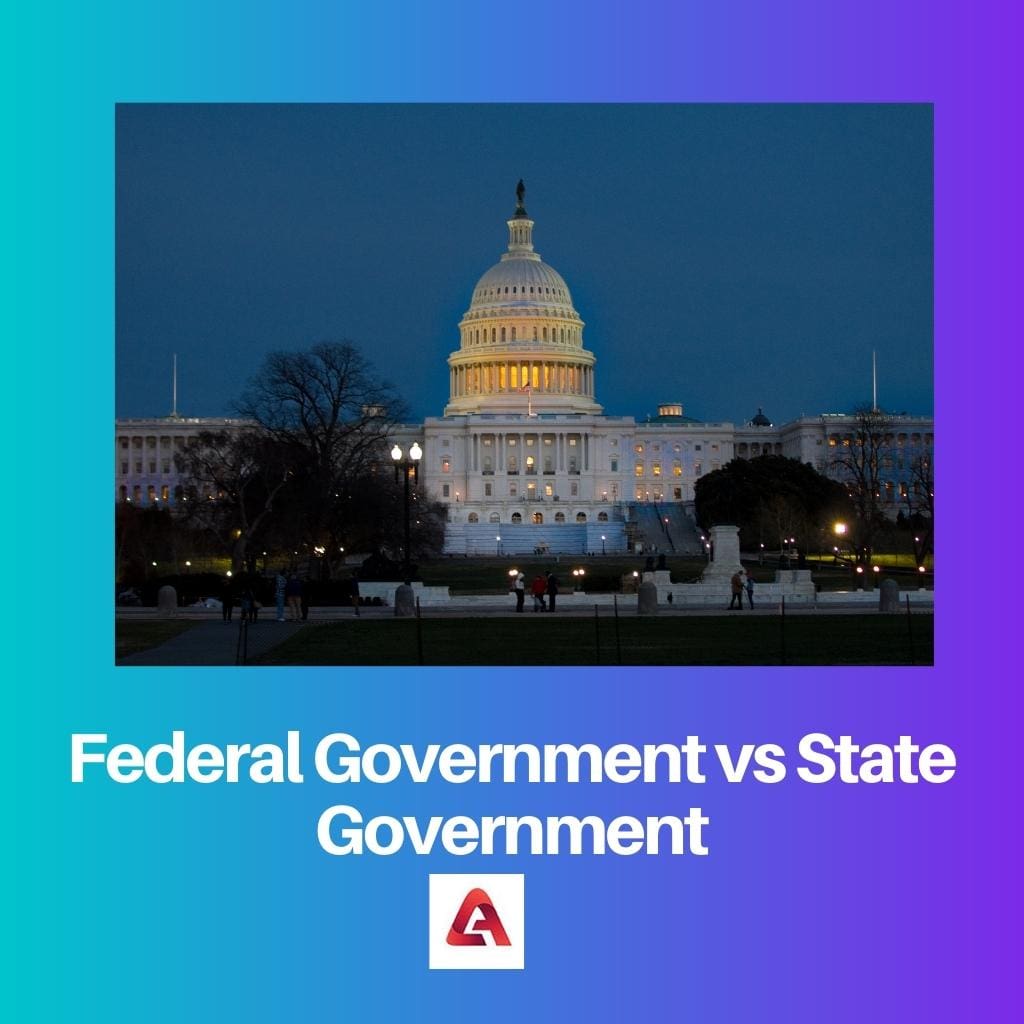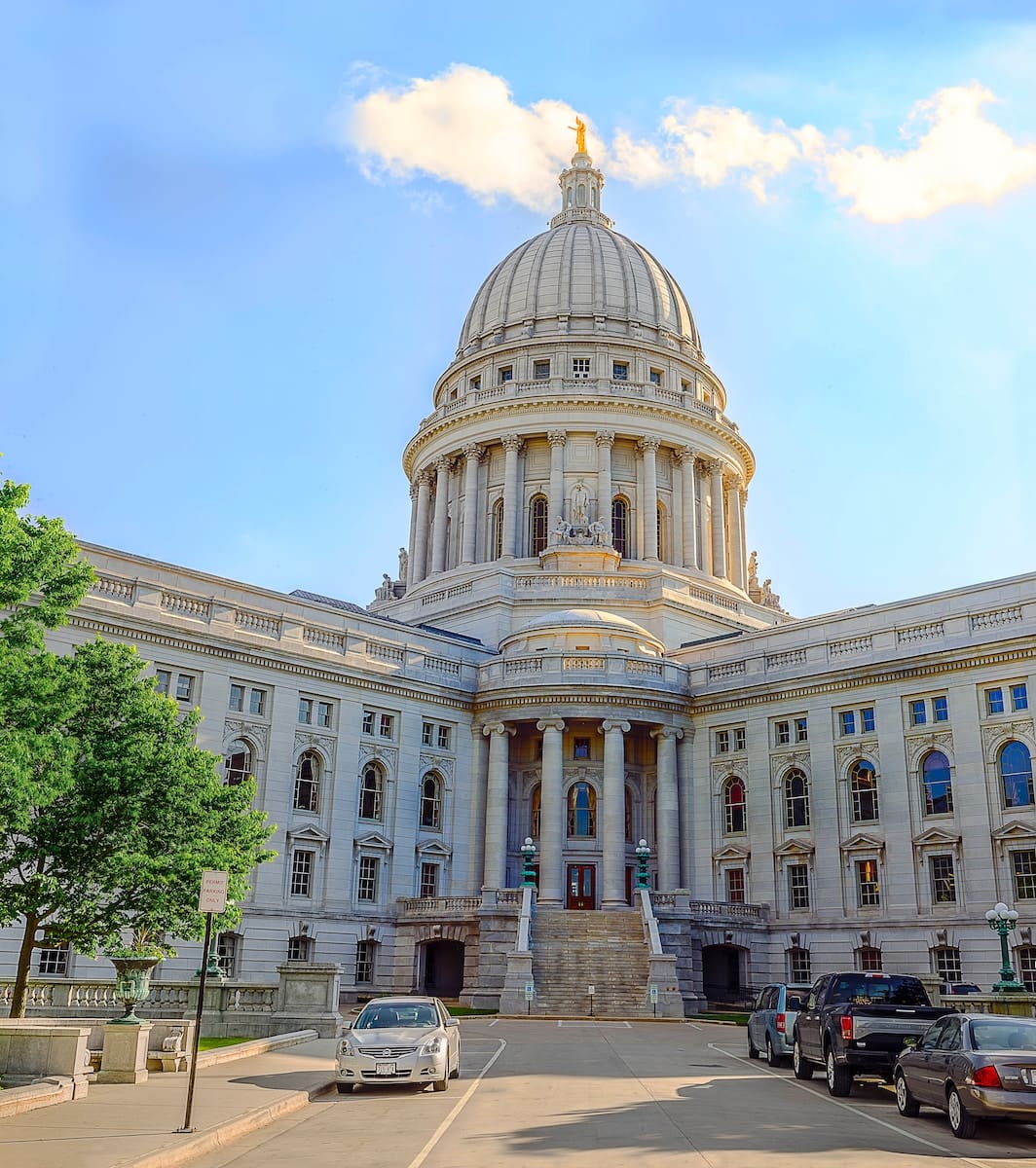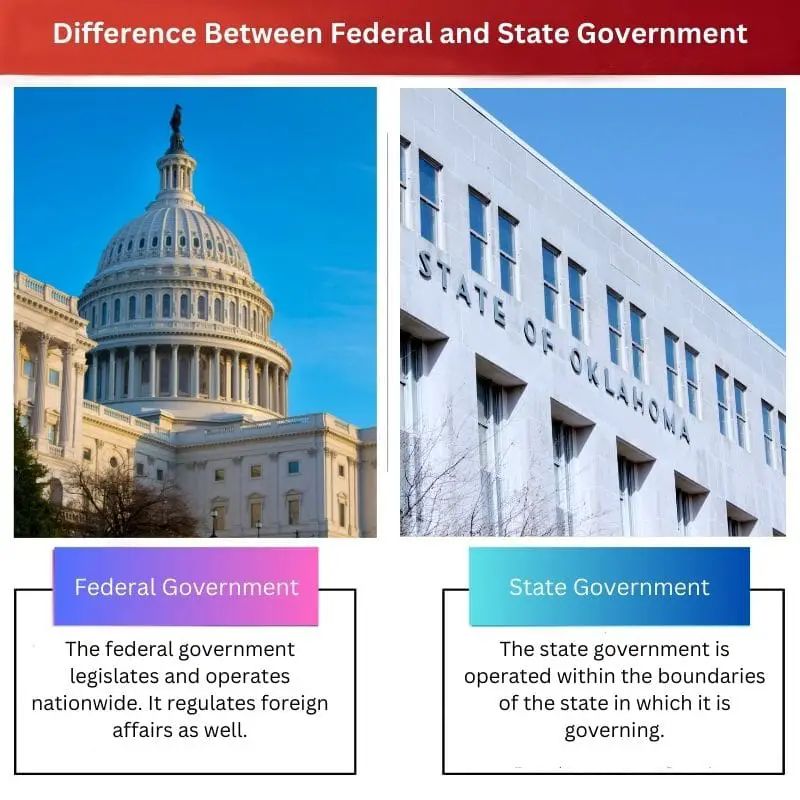For every nation, the government always holds the power to regulate and legislate the functioning of the nation.
Federal and state governments both have several powers, respectively, but the major difference between these two is the execution of their powers which has been done for their respective areas.
Key Takeaways
- The federal government is responsible for overseeing the entire country, while the state government is responsible for governing individual states.
- The federal government has authority over national defence and foreign affairs, while the state government has authority over issues such as education and public safety within the state.
- The federal government comprises three branches (legislative, executive, and judicial), while the state government comprises two branches (legislative and executive).
Federal Government vs State Government
The difference between the federal government and state government is that the federal government has the power or the authority to regulate the different states of the nation, and on the contrary, the state government has the power to regulate within the boundaries of the state in which it is governing, and it simply means that the state government will serve the citizens residing in its state.

The federal government concept is derived from the word Federalism, which means that the government system of a country is segmented, and as a result, the country is operated by two power-holding authorities or a structured form of government.
The federal government legislates the issues which are mainly concerned with the whole nation or nationwide.
The state government is formed to regulate the functioning of the particular state in which it is governed. It regulates the local issues or activities that have been done or regulated within the state’s boundaries.
The state government is responsible for the welfare of the citizens residing in the state, and it has to act according to the powers and authority decided by the legal authority and constitution of the nation. It can also make the relevant rules for interstate trade.
Comparison Table
| Parameters of Comparison | Federal Government | State Government |
|---|---|---|
| Meaning | The federal government legislates and operates nationwide. It regulates foreign affairs as well. | The state government is operated within the boundaries of the state in which it is governing. |
| Powers | It has the authority to regulate the functioning of the states. | State government can only regulate their governing state and has no authority or power to operate the functioning of other states. |
| Law-making | Federal Government can formulate a law that is applicable nationwide. | It can only formulate the law for the citizens of the state. |
| Foreign Affairs | It can regulate foreign commerce and affairs. | It has no authority to regulate foreign affairs and commerce. |
| Declaring war | The federal government can declare war or an emergency nationwide. | The state government cannot declare war. |
What is Federal Government?
The government is segmented into two major parts for the better functioning of several nations. The word federal government is derived from “federalism”, which consequently means restricting the powers of government by segmenting based on their executive authority over the nation.
The powers are divided into exclusive powers and concurrent powers.
Powers that are restricted to the federal government or state government are termed exclusive powers, while powers that are enjoyed or shared by both the federal government and state government are termed concurrent powers.
The federal government regulates and legislates various functions nationwide, including all the states and territories. These functions include:
- Regulating the national and international trade
- Power to declare war
- Responsible for raising the armed force
- Manage the foreign affairs

What is State Government?
As the name suggests, the ‘state’ government is the regulating authority that operates the issues and functioning of the state that are particularly incurred within the state boundaries.
The state government is responsible for the citizens’ safety in that state. This body of government cannot interfere in international or foreign issues because its power is limited to the state itself.
Some of the powers of state government are described below:
- The state government has the authority to make laws for the welfare of its citizens.
- It can regulate or operate commerce from one state to another.
- They have the power to set up the local government authority, including municipalities and counties as well.
- They can regulate the factories or industries operating in their state.
Main Differences Between Federal Government and State Government
- The federal government has more power and responsibilities than the state government because it also legislates national and foreign affairs and regulates the functioning of all states. On the other hand, the state government will only regulate the issues and affairs of its state.
- The federal government has the authority to establish inferior courts so that it would be easier to regulate the legality, but the state government does not have the power to do so.
- The federal government can raise the forces or armies and is also responsible for maintaining them, but the state government has no interference in raising the armies. It only works for the citizen residing in its state.
- The laws play a significant role in operating a nation. Laws formulated by the federal government are applicable nationwide and followed by all the states, but the laws formulated by the state government are applicable only to the citizens of that state.
- Having foreign commerce or trade is important because it eventually contributes to the country’s economic development. The federal government is responsible for international trade and operates the functioning of commerce related to foreign countries. On the contrary, the state government cannot regulate international trade.

- https://journals.sagepub.com/doi/abs/10.1177/109114219001800304
- https://journals.sagepub.com/doi/abs/10.1177/1065912907304496
- https://www.sciencedirect.com/science/article/pii/S1094202516300308

The comparison table provided here is very helpful in summarizing the key differences between the federal government and state government.
Understanding the division of powers between federal and state governments is crucial in understanding the political structure of a country.
The article effectively outlines the major differences between the federal and state governments and their respective functions in a structured government system.
The explanation of the state government’s powers and responsibilities helps to highlight its role at the state level, maintaining the welfare of citizens within its boundaries.
The comprehensive overview of the federal and state governments allows for a clearer understanding of their roles in governing a country.
Understanding the differences in law-making powers between federal and state governments provides insight into how legislation is implemented at different levels.
It’s interesting to see how the federal and state governments have distinct powers and how they work together in a structured government system.
This article does a great job explaining the differences and responsibilities of the federal and state governments in a concise manner.
The concept of exclusive and concurrent powers explained here helps to clarify the different roles of federal and state governments.
This article provides a clear overview of the federal government and state government, making it easier to understand the functioning of these entities.